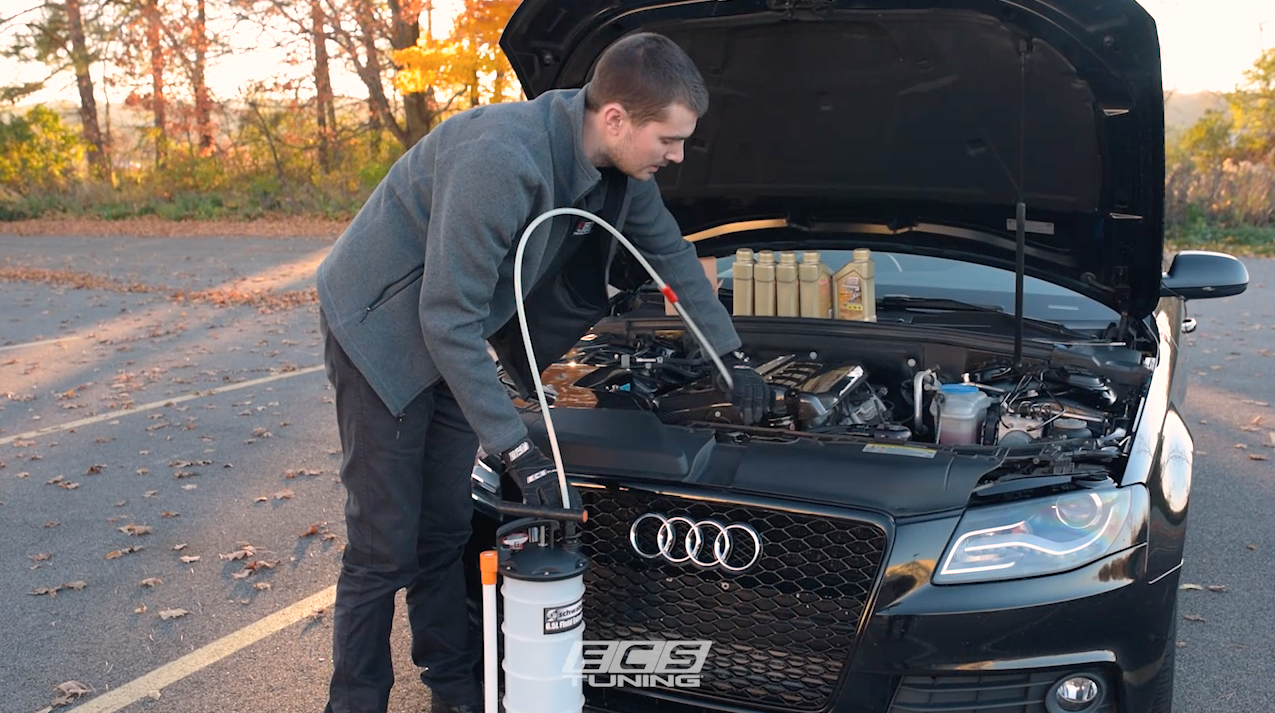When we introduced the Schwaben Fluid Extractor, it was met with some understandable skepticism. Many DIYers and mechanics alike weighed in and made their arguments for or against the method of changing oil with a vacuum device like the fluid extractor. We showed in our video that it is the easiest way to perform your oil service, provided you have a top-mounted filter and a traditional dipstick, but had not actually proven the theory that it is also the most effective way to change your oil. Recently, we recorded another video to tackle that very subject since the question has been asked so many times as to whether the fluid extractor actually removes all the oil.
I picked a random car that I had never touched before to ensure all elements were going to be a surprise. Chris, a coworker, provided his MK6 Jetta 1.8TSI for the procedure. I grabbed the appropriate amount of LIQUI MOLY Molygen oil, a new magnetic drain plug, and a MANN filter for the car to complete the oil service, and brought it all with me to our R&D shop. I then pulled the Jetta up to a lift, racked it, and popped the hood.
Before I began, I had to restate the test: this was for science, after all. There are two competing theories. The first, which is pro-extractor, is that with traditional draining, some oil will be left in the pan thanks to the valleys in the baffles that will trap sediment and leftover oil while the extractor will pull everything from the bottom up, leaving no oil or debris remaining. The second theory is that traditional gravity draining is better and argues that the fluid extractor leaves some oil in the pan. Only one could be right, so I set to find out.
Our test would be as follows: we would extract all the oil with our Dual-Action Fluid Extractor until it wouldn’t suck any more out. Then, we would lift the car and open the drain plug. Simply put, if anything was left in the pan, we would see it when the drain plug was removed. So, I threaded the line into the Jetta’s dipstick and began to pump the extractor.
It is important to extract the oil when it is warm, which I did, to take the least amount of time. Truthfully, it is not the fastest way I have drained oil, but it is the most convenient. With just a few pumps of the handle, the extractor began sucking all the oil from the engine and filled up the container of the extractor. The convenience of the reservoir is that you don’t have to pour a flimsy drain pan into an old oil bottle and inevitably spill half of it. The container has a cap and easy pour spout, so you just have to take the full extractor to your local oil recycler and dump it in. That makes life much easier when the oil change is done.
After about ten minutes, the extractor made its telltale bubbling noise that signified little oil was left in the engine. I gave it some cursory pumps to pull everything out I could. When I was confident there was no more oil that would be pulled by the extractor, I pulled the hose out and raised up the Jetta on the lift.
At this point, if you watch the video, you will see this BMW enthusiast touch the underside of his first Volkswagen ever. Be warned, I struggle for a bit to find the (stupid) torx drain bolt on the back of the pan. Fortunately, I had a new ECS magnetic drain plug that was a (normal) 15mm bolt that stuck out from the pan. I say fortunately because whoever changed the oil last on this Jetta used hulk-like strength to over tighten the bolt and mildly stripped it out. With the help of our head technician, we were able to remove the bolt.
With great anticipation, I slowly threaded the bolt out. At that point, I was only about fifty-percent sure I was not about to be splashed in the face with warm, used, engine oil. To my surprise, nothing came out from the plug with it entirely removed. Not but a single small drop that had been in the threads of the plug itself came from the pan, and a quick check with my finger exposed that the inside of the pan was essentially completely dry. No debris, shavings, or leftover oil. With that, I installed the new drain plug and lowered the car down.
Exactly 5.7 quarts, the precise amount for the 1.8TSI, were present in the fluid extractor. All oil in the Jetta was safely and easily removed, leaving nothing in the pan save a single drop. With that discovery, I can assuredly say yes, you can confidently change your oil with the most convenient method out there and know it is, in fact, the best method. The Schwaben Fluid Extractor allows you to change your oil quickly without jacking up the car, which makes it perfect for home garages, parking lots, or at the track for the best service. With these findings, I can confidently say that the fluid extractor method does work as well or better than traditional gravity draining. Now we know the answer and the argument can finally end. Check out the attached videos to see exactly what we did!






